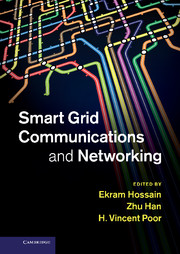Book contents
- Frontmatter
- Contents
- List of contributors
- Preface
- Part I Communication architectures and models for smart grid
- Part II Physical data communications, access, detection, and estimation techniques for smart grid
- 5 Communications and access technologies for smart grid
- 6 Machine-to-machine communications in smart grid
- 7 Bad-data detection in smart grid: a distributed approach
- 8 Distributed state estimation: a learning-based framework
- Part III Smart grid and wide-area networks
- Part IV Sensor and actuator networks for smart grid
- Part V Security in smart grid communications and networking
- Part VI Field trials and deployments
- Index
7 - Bad-data detection in smart grid: a distributed approach
from Part II - Physical data communications, access, detection, and estimation techniques for smart grid
Published online by Cambridge University Press: 05 January 2013
- Frontmatter
- Contents
- List of contributors
- Preface
- Part I Communication architectures and models for smart grid
- Part II Physical data communications, access, detection, and estimation techniques for smart grid
- 5 Communications and access technologies for smart grid
- 6 Machine-to-machine communications in smart grid
- 7 Bad-data detection in smart grid: a distributed approach
- 8 Distributed state estimation: a learning-based framework
- Part III Smart grid and wide-area networks
- Part IV Sensor and actuator networks for smart grid
- Part V Security in smart grid communications and networking
- Part VI Field trials and deployments
- Index
Summary
Introduction
This chapter is motivated by the fact that wide-area monitoring, control and protection (WAMPAC) are becoming increasingly important in the vision for future smart grid operations [1]. Technological advances in sensing, communication, and computation could enable smart grid operations with improved situational awareness. This improved situational awareness could lead to more reliable and economical integration of renewable energy resources, as well as to the prevention of potential blackouts [1].
Given the need for improved situational awareness in large interconnected power systems, a key research challenge is to develop fast and robust state-estimation techniques for wide-area monitoring. State estimation converts redundant measurements into reliable estimates of the state of an interconnected electric power system [2]. For wide-area state estimation, which involves multiple system operators or utilities, it is more desirable to develop distributed approaches to obtaining the system-wide states through limited information exchange among the system operators [3, 4]. In our recent work [5], a fully distributed and fast state-estimation method is proposed with provable convergence with centralized state-estimation results.
One essential function of a state estimator is to detect, identify, and eliminate measurement errors if possible. Such functions in power system operations are defined as ‘bad-data processing’ [6]. The main objective of this chapter is to review the bad-data processing techniques and propose a fully distributed bad-data detection algorithm for wide-area state estimation. In particular, the focus of this chapter is to (i) formulate the bad-data processing problem in a fully distributed manner; and (ii) design an information-exchange scheme among different control centres for provable distributed bad-data detection performance.
- Type
- Chapter
- Information
- Smart Grid Communications and Networking , pp. 175 - 190Publisher: Cambridge University PressPrint publication year: 2012
- 1
- Cited by



